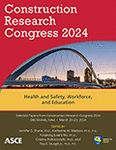Support Vector Machine Analysis of Construction Workers’ Automatic Behavior and Visual Attention
Publication: Construction Research Congress 2024
ABSTRACT
Automaticity is a core attribute of skill that is achieved as the attentional requirement gradually diminishes as proficiency increases with practice or repeated execution of a task. Hence, it is a phenomenon that affects workers’ performance both positively (e.g., productivity) and negatively (e.g., accident involvement). Nevertheless, despite its significance, little is known about the effects of automaticity in the construction industry. To address this knowledge gap, this study used eye-tracking technology to examine the effects of automaticity on attention to productivity and safety-related areas of interest (AOIs) during repetitive construction activities. To achieve this research objective, 28 participants were recruited for a simulated roofing experiment. Based on the participants’ attentional distributions, this study employed a support vector machine to distinguish and identify workers who are exhibiting automatic behaviors from those who are not. The findings of this study discovered that although automaticity can improve productivity, it can also cause workers in the construction industry to pay less attention to safety-related AOIs, which puts them at greater risk of safety hazards. Construction managers can use this study’s model to predict automatic behaviors among workers to evaluate productivity and identify at-risk workers.
Get full access to this article
View all available purchase options and get full access to this chapter.
REFERENCES
Charlton, S. G., and Starkey, N. J. (2011). Driving without awareness: The effects of practice and automaticity on attention and driving. Transportation research part F: traffic psychology and behaviour, 14(6), 456–471.
Charlton, S. G., and Starkey, N. J. (2013). Driving on familiar roads: Automaticity and inattention blindness. Transportation research part F: traffic psychology and behaviour, 19, 121–133.
Cortes, C., and Vapnik, V. (1995). Support-vector networks. Machine learning, 20, 273–297.
Elen, A., Baş, S., and Közkurt, C. (2022). An adaptive gaussian kernel for support vector machine. Arabian Journal for Science and Engineering, 47(8), 10579–10588.
Esmaeili, B., Hallowell, M. R., and Rajagopalan, B. (2015). Attribute-based safety risk assessment. II: Predicting safety outcomes using generalized linear models. Journal of construction engineering and management, 141(8), 04015022.
Feit, A. M., Weir, D., and Oulasvirta, A. (2016, May). How we type: Movement strategies and performance in everyday typing. In Proceedings of the 2016 chi conference on human factors in computing systems (pp. 4262–4273).
Gaonkar, B., Shinohara, R. T., Davatzikos, C., and Alzheimers Disease Neuroimaging Initiative. (2015). Interpreting support vector machine models for multivariate group wise analysis in neuroimaging. Medical image analysis, 24(1), 190–204.
Gholizadeh, P., Onuchukwu, I. S., and Esmaeili, B. (2021). Trends in catastrophic occupational incidents among electrical contractors, 2007–2013. International Journal of Environmental Research and Public Health, 18(10), 5126.
Hasanzadeh, S., Esmaeili, B., and Dodd, M. D. (2017). Impact of construction workers’ hazard identification skills on their visual attention. Journal of construction engineering and management, 143(10), 04017070.
Koposov, D., Semenova, M., Somov, A., Lange, A., Stepanov, A., and Burnaev, E. (2020, June). Analysis of the reaction time of esports players through the gaze tracking and personality trait. In 2020 IEEE 29th International Symposium on Industrial Electronics (ISIE) (pp. 1560–1565). IEEE.
Kuusisto, F., Costa, V. S., Nassif, H., Burnside, E., Page, D., and Shavlik, J. (2014). Support vector machines for differential prediction. In Machine Learning and Knowledge Discovery in Databases: European Conference, ECML PKDD 2014, Nancy, France, September 15-19, 2014. Proceedings, Part II 14 (pp. 50–65). Springer Berlin Heidelberg.
Martens, M. H., and Fox, M. R. (2007). Do familiarity and expectations change perception? Drivers’ glances and response to changes. Transportation Research Part F: Traffic Psychology and Behaviour, 10(6), 476–492.
Meyer, D., Dimitriadou, E., Hornik, K., Weingessel, A., Leisch, F., and Leisch, F. (2021). e1071: Misc Functions of the Department of Statistics, Probability Theory Group (Formerly: E1071), TU Wien. R package version, 1, 7–6. https://CRAN.R-project.org/package=e1071.
Onuchukwu, I. S., and Esmaeili, B. (2022). Random Forest Analysis of Occupational Accident Reports among Roofing Contractors. In Construction Research Congress 2022 (pp. 561–570).
R Core Team. (2019). R: A language and environment for statistical computing. R Foundation for Statistical Computing, Vienna, Austria. URL http://www.R-project.org/.
Reingold, E. M., and Sheridan, H. (2011). Eye movements and visual expertise in chess and medicine.
Robbins, C., and Chapman, P. (2019). How does drivers’ visual search change as a function of experience? A systematic review and meta-analysis. Accident Analysis & Prevention, 132, 105266.
Stefanidis, D., Scerbo, M. W., Korndorffer, J. R., Jr., and Scott, D. J. (2007). Redefining simulator proficiency using automaticity theory. The American Journal of Surgery, 193(4), 502–506.
Stefanidis, D., Scerbo, M. W., Montero, P. N., Acker, C. E., and Smith, W. D. (2012). Simulator training to automaticity leads to improved skill transfer compared with traditional proficiency-based training: a randomized controlled trial. Annals of surgery, 255(1), 30–37.
Toner, J., Montero, B. G., and Moran, A. (2015). The perils of automaticity. Review of General Psychology, 19(4), 431–442.
Information & Authors
Information
Published In
History
Published online: Mar 18, 2024
ASCE Technical Topics:
- Artificial intelligence and machine learning
- Automation and robotics
- Business management
- Computer programming
- Computing in civil engineering
- Construction engineering
- Construction management
- Employment
- Engineering fundamentals
- Human and behavioral factors
- Labor
- Occupational safety
- Personnel management
- Practice and Profession
- Productivity
- Public administration
- Public health and safety
- Safety
- Systems engineering
Authors
Metrics & Citations
Metrics
Citations
Download citation
If you have the appropriate software installed, you can download article citation data to the citation manager of your choice. Simply select your manager software from the list below and click Download.
